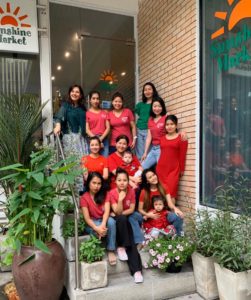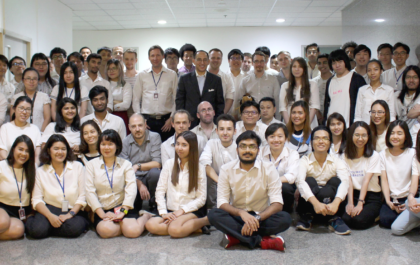According to Premchit and her sister Prem, passion is everything.
Motivated by love for their business and for the people they work with, they’ve managed to grow Sunshine Market into one of the best-known names in the organic health food space in Thailand. Connected to this is Niraamaya Center, that helps individuals achieve optimum health through integrated health services. Next on their list is a permaculture farm to sustainably grow local produce, and also to educate other landowners on ways to work with nature while profiting at the same time.
Enjoy this interview with two very enterprising and hard working sisters.
Genup: Tell us about yourself.
Premchit: Okay, so I was sent to boarding school at a very young age. It was around 8 years old. So when I went there, I didn’t know a word of English. It was just kind of like a total different world. When I went to class, I just didn’t understand a thing what anybody was talking about. Gradually of course you do pick up the language and then you adjust to the environment. First year was very hard. And after that you adjust, you make friends. And then I spent a good like eight years in boarding school and made some good friends. And then I finished school in India and came back to Thailand. And in those days, your parents would never send you anywhere else after that, like for your further education. So it had to be in Bangkok to be close to them.
So, it was not much of a choice to choose which college you wanted to go to. Basically the only college that existed during that time for international students was of course ABAC (Assumption Business Administration College). So we enrolled. Oh yeah, before we went to ABAC, I and my older sister were in a vocational school, which kind of taught you accounting and, you know, sort of administration stuff like secretarial jobs. That also was because there was not much choice. Like your relatives go, you also follow, kind of follow the herd thing.

So after that, my older sister got married and I still had a lot of time left, so I looked into ABAC and we just enrolled there. Did four more years of college, of Bachelors. And then graduated business school. And after that marriage happened. We started a family and I have 3 kids.
Prem: My parents sent me a bit a later to boarding school… I’m actually seven years younger, so by the time it happened, I think I was 13. And at the first boarding school I ran away and came back home.
And so they sent me again to another one, far away in Mussoorie, India, and I actually stayed there for four and a half years. Finished high school, came back, and went to Mahidol University in Thailand, did computer science. I graduated in software engineering, and I got a job and continued even after I got married and had a kid. I worked for nine years in software engineering until I was pregnant with my second son and then I quit my job.
Genup: And so why did you decide on entrepreneurship?
Prem: So, that was because I was an employee for a very long time. Premchit was also working in the same company, she was in administration and secretary to the big boss. And then when I had kids, it was just about flexibility. I quit and a short while later, she quit too.
We both just wanted to be able to be without kids and also be working and earning. So that’s when we decided to start Piñata, our party supply store.
So that was our first business.
Genup: And did your families support you in your decision to quit and start out on your own path?
Prem: Well, I don’t think I gave my husband that much of a choice. It was more of me saying that I’m going to do this. But my dad helped us financially to start. He didn’t help us that much. But whatever we got, we made do with it, and we thought, we’re just going to do this. So family support, yeah a bit.
Premchit: Our dad did help us, but he didn’t know what it was all about either. There was nothing out there like it, so our families didn’t have any idea about what we were going to do. So it was quite difficult to convince him to put his money into something that he didn’t know anything about. I think he had already made up his mind that he would write that money off.
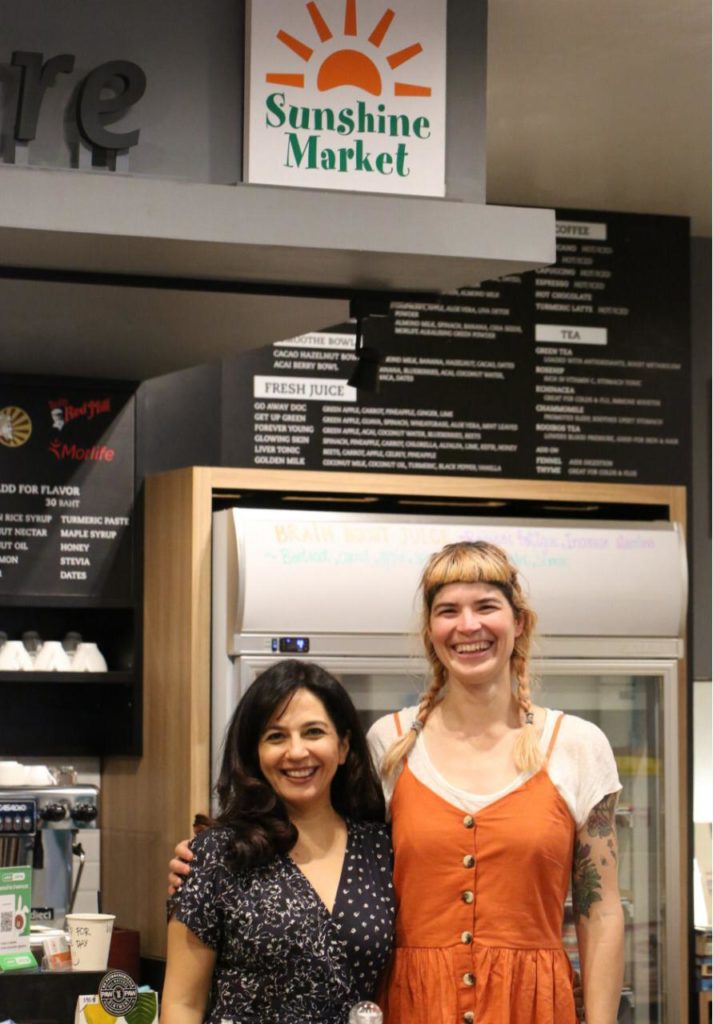
Genup: And Piñata was successful, after which you started Sunshine Market. Can you tell us what it is about? What is the core concept?
Prem: Yes, about Sunshine Market… My son is 19 now, and when he was 6 years old, he got really sick. He got so sick that the doctors didn’t know what to do, and they just told me to keep giving him medication. And then, I actually Googled and searched the internet and found a few things. And that was when this whole concept started. Because it was nutrition that helped him get over it.
I actually took him to Australia, researched on nutrition, changed his diet completely for two years, and he got better. He’s all fine now. But that’s how the concept came about.
So I realized that there must be other people who needed something like this, who needed and can’t find good clean nutrition, because I couldn’t find anything. We traveled to Australia like three, four times a year and I used to load like two, three suitcases of food back I think we started Sunshine market seven years ago, so it was quite long after he got better.
And then we also started Niraamaya Center which is attached to Sunshine Market because it’s all a whole big concept that, you know, just not one thing you need. You need a combination of things to stay well.
Niraamaya Center is for alternative health. I think everybody should have a choice on how they want to get treated. So it’s more like a choice. It’s not something that is a miracle cure or whatever. It’s just something of a support to people.
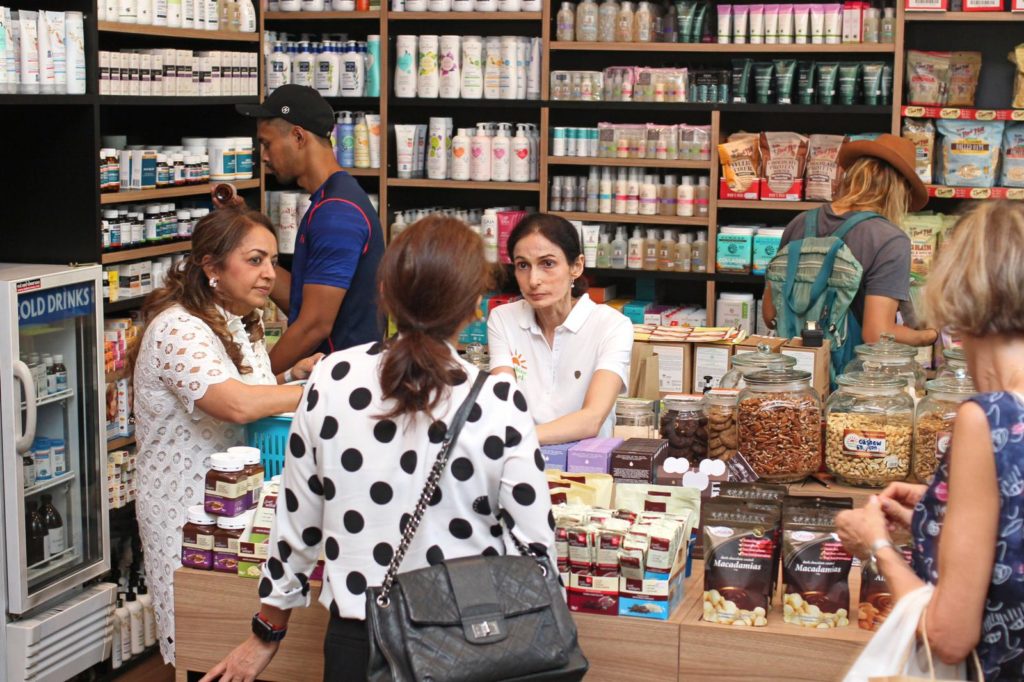
And Sunshine Market is also a choice. This is what you need to do, especially now with COVID-19. You can actually see that your immune system, your health, is being tested now. To me, nutrition is the biggest part of anyone’s life. When you’re healthy, you can do a lot of things. Everything else is just nothing. You can handle anything as long as you have your health.
So Sunshine Market is a store, it’s all about nutrition and there’s no crap in there. I will not sell crap. Anything that I would eat or give my children, I will sell it. But nothing that is crap is in there. It’s what we bake, what we cook. There’s no gimmick. It’s not like we’re following a trend, this is real researched nutrition. And we also have an excellent nutritionist who works with us.
Genup: Who’s your ideal customer?
Prem: Who is my ideal customer? People who are sick actually, people who have allergies, those are my ideal customers. Because the results are amazing. And they’re the ones who will go out and talk about it. Like I’ve had so many customers who’ve come in and feel so much better. We’ve had customers who’ve moved their house, their apartments closer to us…because they feel like this is where they can come and they can find things, just come in have a chat, you know, talk about their health. It’s very satisfying.
Genup: So when you walk into Sunshine Market, what can the customer expect? How does it work? Or is it just a store, you shop around.
Prem: People come in and shop around, and some people know exactly what they want. But we have customers that have been with us from the beginning who actually come in and actually want to chat. So I’m almost always there every day. And I sit right there in the middle of it all. I don’t have an office. People come in, they want to talk, they want to ask questions, they want to find out what’s best for them, what protein is good for their kids, whatever. I’m always there. And my staff… two of my staff have been there from the beginning. So they are very well educated. They are able to give suggestions, give advice. And since it’s also a shop and a bakery. So there are people who walk in and know exactly what they want and they will come in and pick it up and they will leave.
Genup: Do you use the internet at all? Are there other marketing channels besides retail?
Prem: We’ve got an Instagram, we’ve got Facebook, and website.
Premchit: Line, we have Line, the app.
Prem: They chat with us on Facebook too, every single day. There, I’m getting messages, on Facebook right now as we talk.
Genup: Did you follow a business plan at all when you started out?
Premchit: There’s no business plan.
Prem: I’ve never done a business plan in my whole life. I think businesses take you. You need to be able to look for places that it’s taking you. That’s what I feel. Because when I started, I had a different idea in my head, but it turned out completely different than what I had in my head.
Genup: So you have to be quick to adapt, that’s what you’re saying.
Prem: Yes, exactly.
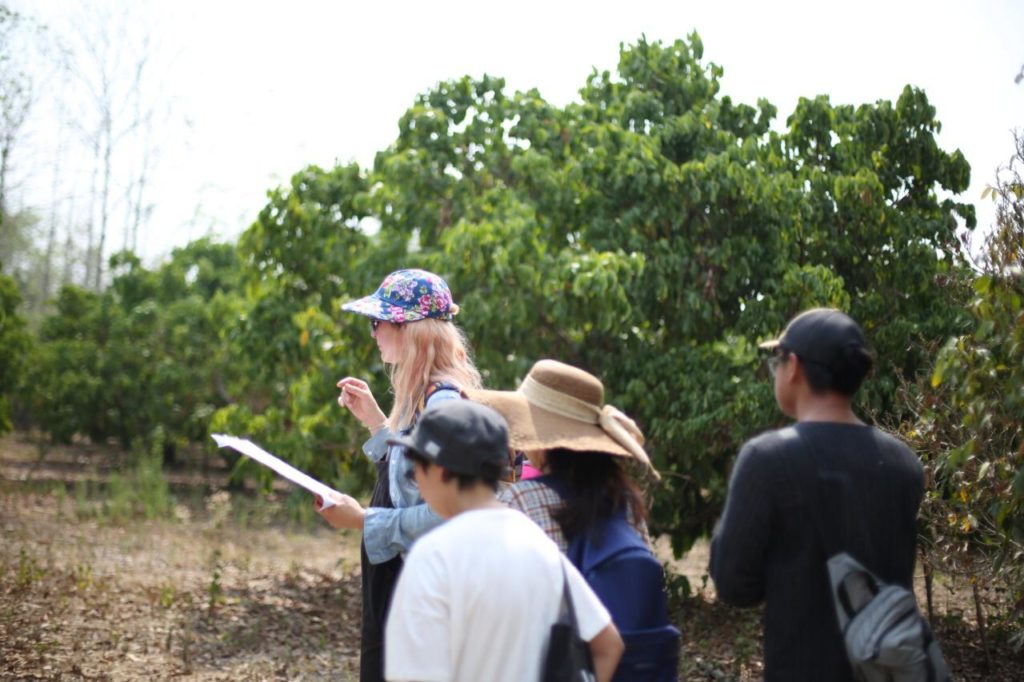
Genup: What were your initial hurdles? What mistakes did you make along the way?
Prem: The biggest hurdle is actually the government. We deal a lot with the government because we have to register our products with the FDA. We had to register Niraamaya as a clinic. And all that didn’t happen when I opened the shop because I got cheated along the way. But I opened it anyways without any licenses, without anything. And then figured it out along the way. Now I actually know exactly what we need. But at that time, there were people that was misleading me everywhere. I actually handed a check over to someone who just took my money and went away. But I got it back eventually. But still, that was, is still the biggest the hurdle. The biggest hurdle in my business is actually the government, dealing with the government. Every time a shipment arrives, there are all these documents that need to be prepared. And I deal a lot with the embassies, because they are actually quite a big help, the US Embassy. They’re very supportive. They help with certifications. They have helped me talk to the government. Like right now, everything that comes in, a certificate needs to be authorized by the embassies. So if I’m getting something from the US, papers needs to be authorized, and certificates needs to authorized by the US Embassy. They will support you in many ways. So they have talked to the head of the FDA for us, and say that you know, if this company is bringing in things from the US, we have already verified their certificates, there’s no need for physical evidence and… you know, so things like that.
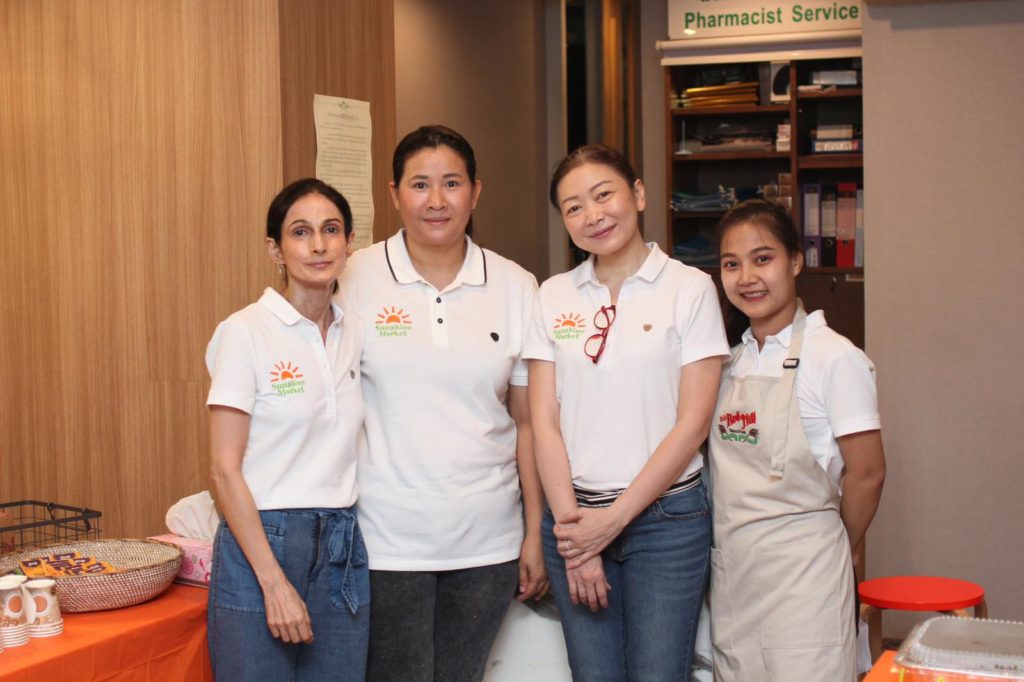
Prem: They also support us in funding as well sometimes. I have sent my bakers to learn in the US when they will have seminars or cooking events or things like that. There will sponsor us to go for free. I have also had my niece sponsored for a whole trip to the US to go and train. We didn’t have to pay.
This is the USDA we’re talking about, because we deal with organics, and once they give you a certification, it is easier with the Thai FDA to get the permissions and approvals.
The Thai FDA is, I don’t know where they are. But see, you have the head of the FDA sitting in an office and then you have people who are the FDA sitting at the customs when your stuff comes in. And they don’t communicate. So the head of the FDA could say, okay, this is okay for you, but when my shipment arrives, and they’re going to be like, this is not okay, you have to go and reregister, you’re missing a word on your registration, you’re missing a letter in how you spell chocolate (in Thai). This is the real thing. Chocolate in Thai, so I must have misspelled it. We use ko kai instead of kho kwai, or something like that. My stuff was stuck for two weeks, I had to go and change it to a kho kwai and then come back and clear it.
So you have to be clear on both sides.
I did not know all this though when I started. I did not know. Maybe I wouldn’t have done it.
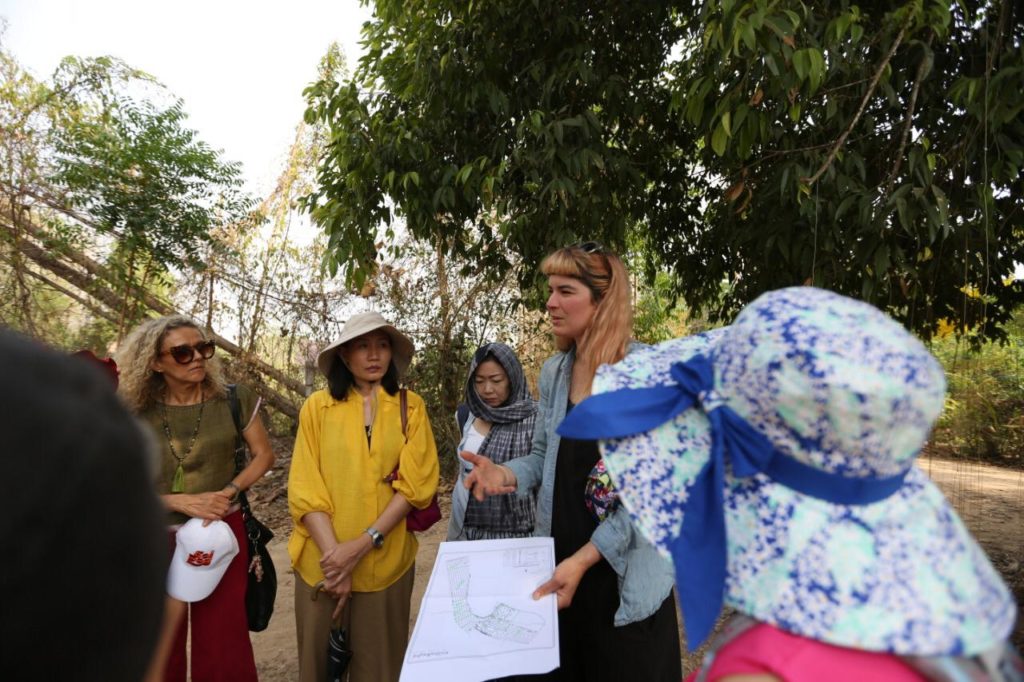
Genup: Are the rules easier now?
Prem: No. It’s actually going backwards. The FDA has not progressed, and I’ve told them to their face. They just come to the store and check. Or they will pick up your products from the supermarket and then send you a letter that this is wrong, that is wrong, you’re not putting this right. There may be an easier way like giving them some “side money” or something, but I don’t bribe. I try to go through it properly, then… because bribing doesn’t end. And it only makes you more and more scared, and then you have to bribe and bribe more.
So I actually invest quite a bit onto this part of the business because then it makes it easier to expand. it’s better for you to be doing this correctly.
Genup: Yes, doing it correctly, this is almost like a moat that keeps competitors away. It becomes hard for new players to enter this space.
Prem: That’s right. That’s why we don’t have that much. And now people knock on our doors to sell their things, to import their stuff, because now we know how to do this.
Genup: Where do you see the business five years from now?
Prem: People ask me a lot about that.
Premchit: Permaculture. That is our future.
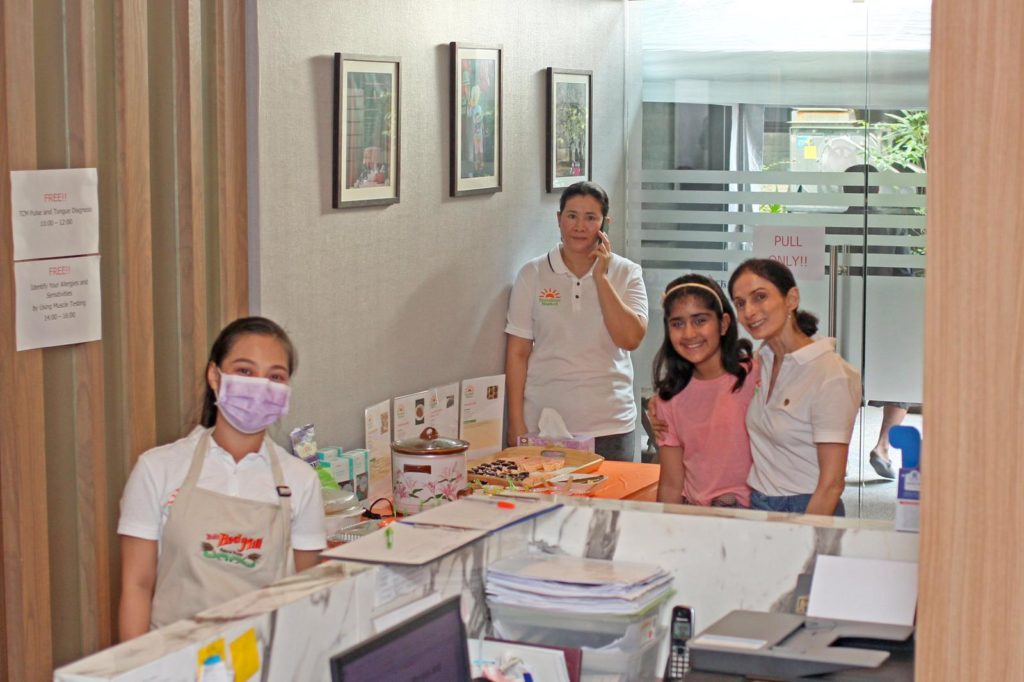
Prem: Yeah. I’ve never thought that I wanted more of Sunshine Market everywhere, so that was never my goal to have 500 stores around the country. Because I think it’s very hard. We already distribute to supermarkets. So it’s easy for people to go pick up our stuff. We’re everywhere. We’re in Ubon, we’re in Chiang Rai, we’re even in Laos. It’s just that Sunshine Market is not there physically yet. But I feel like in five years, I want to see more local health shops opening up everywhere and our products can be sold there. So that’s what I feel should be.
And then I want to move backwards. So actually, because we have a lot of imported things, and that bothers me a lot. Because that’s not the real concept of eating healthy. I feel like I’m going against my own belief in that way. So I want to move backwards and start going back to producing things, making things local, even if it’s just not that much variety.
So that’s why we bought this land together up in Chiang Mai because we want to start a prototype. And then educate. Actually not only educate, but my idea is to get land from people who have money to spend and don’t know what to do with their land. So that’s actually where we want to go. Maybe open up Sunshine Market in Chiang Mai, have delivery services for all these permaculture produce that we’re producing. Educate the farmer a bit more, because I think it will come back to that eventually.
You know food, because not all food is equal. Like you can eat a carrot from a chemical farm. And you can eat a carrot from a farm that is grown differently. It will be different.
Prem:
So Sunshine Market is flourishing, it’s distributing, It has its own life. So the way I feel is that we need to move a bit backwards.
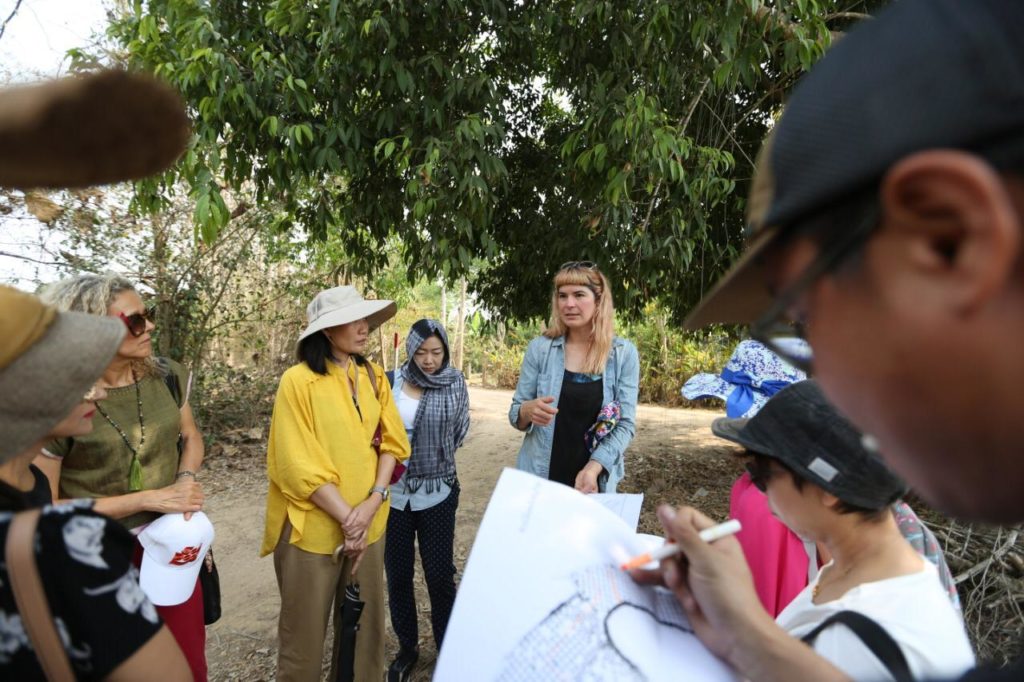
Genup: Can you talk to us a bit about permaculture?
Prem: So permaculture is actually… Do you know how people say that you need to be sustainable, but we’re a bit late on that sustainability. We should have been sustainable 30 years ago. So now we need to regenerate. What happens now is that the soil, and you know, the whole agriculture has become so monopolized, and it’s all monoculture. So soon you will see more places like Esan (Northeast Thailand). Esan used to be where the country grew all its food. Now it’s all dead. No food is going to be grown there for a very long time because it’s all become desert, all because of monoculture.
So you can’t really grow just one crop on the land for the next hundred years. It’s not going to work. So permaculture is more of enriching the soil and growing kind of like a forest food. People think that you can’t really make money off it, and we’re hoping to prove them wrong.
You don’t have to put in too much work. You don’t have to look after it so much. Things should just flourish and grow on its own. It’s like a good business, you know. You don’t have to be doing every nitty-bitty thing yourself. But it just happens.
So permaculture is more of going back to the soil. Getting the soil to be healthy so that things are growing. You don’t have to put chemicals, you don’t have to put plant food, you don’t have to put so much fertilizer. People who live in a permaculture farm would be fertilizing the soil with themselves.
It’s like connecting to the earth again and making it grow things and food for you
You can see how passionate we are about this. It’s because I think that’s where we and the world need to be headed eventually.
Genup: Do you have a venture capital funding, or is it all self-funded, family money?
Prem: So we told you our dad gave us quite a little. It was very, very little money, like totally. I mean, you can’t even say it’s peanuts whatever he gave us. But I actually… We slowly grew, and the bank helped us quite a bit so I have to say that they have been really good to us. I think they saw something and they helped us. Because the first three years, we were growing at 150% a year, and the bank came and told me, that you are growing too fast and you’re going to find yourself in trouble so you need to slow down. So and then the next three years, then we grew at a 30% rate. But I think this year, we’re going to see a big jump. I can see it happen. Everybody is in trouble, financially I know, but everybody has turned to food at this moment. Everybody wants to eat well. Everybody wants to buy healthy things.
Genup: Have you ever experienced business failure, and if so, how did you bounce back? What did you learn from it?
Prem: Yes, we have experienced business failures, quite a few actually. For example there was this one incident. When you’re working with supermarkets, sometimes you have to go along with them. So we had this Villa Market that opened up in BDMS, that is new wellness center on Phloen Chit Road. So the concept was really good, everything sounded good. I sat with my partners, my sister, my nieces, and we talked about it. Because an investment for us is a big deal. Because, we’re barely keeping our heads above water all the time because we keep growing so fast. So we never have enough cash to actually put a down payment into something. So to invest in something has a lot of meaning for us. And we ended up investing quite a bit of money into that. They wanted us to open a smoothie bar, sell our pastries and all that. And obviously the concept sounded good, it’s a hospital. Who wouldn’t want good healthy food or smoothies and stuff there? But nobody goes to that big wellness center and we had to shut it. The first two months it opened, third month I told Villa I’m pulling out. I’m not going to let my staff stand there and I’m not sending any food there because it’s just not making any money. So I had to sit down with the owner of Villa Market, talking about this branch, because he wanted my input. And, he wanted it to be like a 7-11.
So I told him look, if you want it to be like a 7-11, that’s your choice. I’m not going to be a part of it. He wanted me to sell drinks that are not so healthy and not so expensive. So I told him I will take off my logo, leave the space there for them, but I wouldn’t be a part of it.
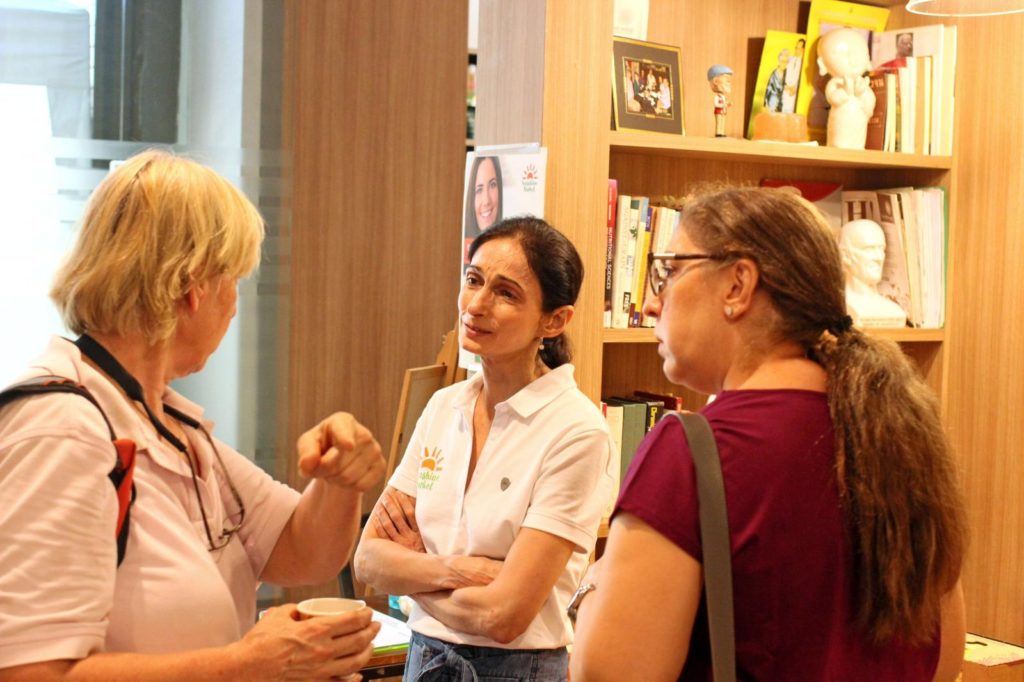
Anyway, they didn’t really care so much, they are pretty big and have other investments. And then because they opened a new branch right on the other side of the road, they forgot about this branch anyway, so our money went down the drain, literally.
I learned that I should trust my gut and not listen to others.
Genup: What do you do to stay motivated? Do you have any tips or strategies for anybody?
Prem: I’m very lucky. Two of my best friends work with me. And I have my sisters with me. I see them all the time. My niece is there. Penny, the naturopath at Niramaaya Center is a good, good friend. She’s the one who helped my son feel better when he was 12. So there’s always motivation, because you got all these people on the same boat as you. And I’ve got great staff too. I look forward to going to work every day.
Premchit: Yeah, I feel exactly the same. I have very good people around me. Good vibes, good energy. Every day I wake up and I bless my stars. I’m like I’m so lucky to have everybody around me.
Genup: Who do you admire?
Prem: I actually admire this lady who helped us to design our farm. Her name is Hanna Maloney. I found her on a permaculture podcast. She’s a person who knows exactly what she wants in life and nobody can actually steer her this way or that way. She is such a focused person. And so real, like you meet her and you know that she is real. She is one person I admire. Whenever I talk to her, Skype her, anything, I get that feeling in my stomach. My inspiration is back, my motivation is back. Because she’s one person that I really admire.
Hannah lives in Hobart, where permaculture originated. She is a consultant, and so she consults the whole of Australia. But she had never done Asia and I stalked her and hassled her, and I got her to come. She’s a great person.
Her Instagram is “goodlifepermaculture” in case you want to be inspired.

The other person is Dr.Sudhir Baldota who lives in India and is a homeopath turned photographer. He’s like my spiritual advisor. So every time I doubt myself or I feel like, you know what the hell am I doing, or what is happening in life, he is there to advise me. I can bounce things off him and then he’ll say things back to me that puts me on a focused path.
So two people.
Premchit: Well I would also put Dr. Sudhir in there. He’s a good friend. He went on a Nepal hiking trip to Annapurna with him. And it was a really great trip and it was all his planning, though it was difficult. We had to sleep on the floor.
And the other people I admire are Bill Gates and his wife. They do good stuff to the world, not only about money. Everything doesn’t have to be about money as long as you’re putting something good into the world, back to the world.
Genup: What don’t you like about being an entrepreneur? What would you tell your younger self about to start on this journey?
Prem: It’s a lot of hard work. I mean I would actually tell myself, younger self, to just be prepared because it’s a lot of sleepless nights, a lot of self-doubt. I don’t like self-doubt and, you know, being this responsible. It’s a lot of responsibility. You don’t get to come back home and just go to sleep.
Premchit: The thing is you have to be responsible for other people, their wellbeing, their livelihood. You’ve got to pay them. It’s a big responsibility.
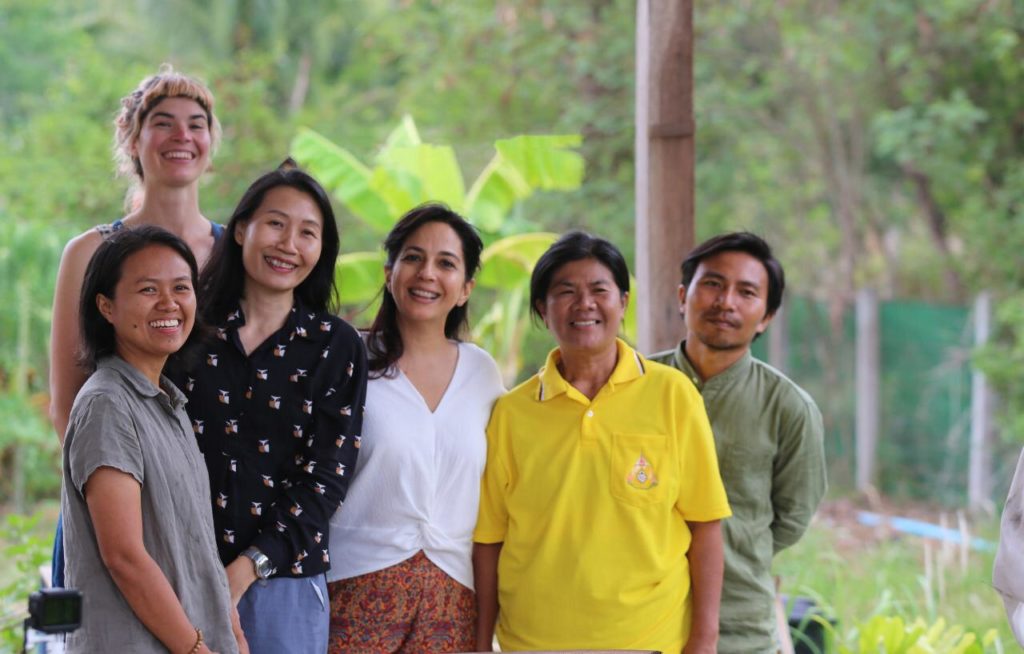
Genup: What does success in life mean to you?
Prem: Success in life for me is relationships. It’s nothing more than that. No material things. I don’t really care. I mean, it’s nice to have a big house and stuff like that, but success to me is relationships. That’s what I value the most in my life, my relationships with people.
Premchit: For me it’s the relationship with your family, with your friends, with the people that you hang out with the whole day, which is your staff. Everybody counts. I too would never put money on top of those. It’s not a measure of your success. You just have to ask yourself questions like, what do you need in your life? And then if you can say yeah, you don’t need that much and you’re happy with what you have, you are successful. You don’t have to be a multimillionaire, or you don’t have to own a big place. You just have to ask yourself, what do you need? Do you really need that much?
You can choose who you want to be with at this age. Don’t need too many friends but even if you have three, four people, but you just value those people, then you’re good. You know they’ll be there for you.
And that is enough. That is success.
Genup: What advice would you give someone who wants to start their own business?
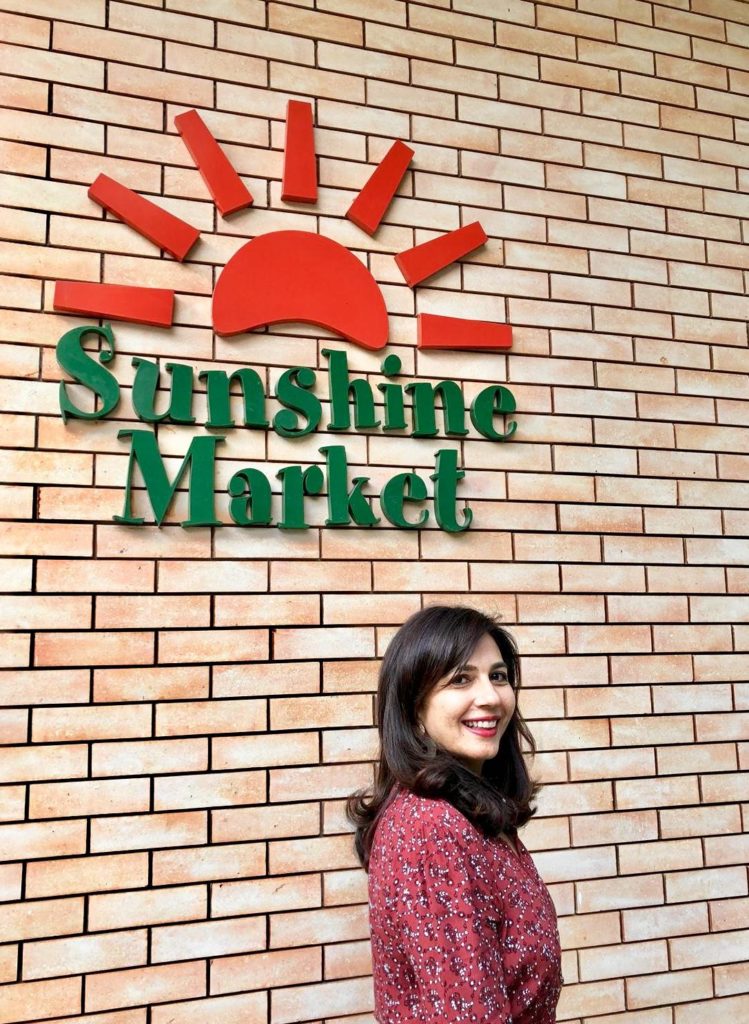
Prem: Be prepared. It’s not as easy as it looks. That’s my advice. I think people look from outside and see us, and they feel, oh wow, I could do that, I should do that. But, it’s not as easy as it looks.
Premchit: You’ve got to be willing to put in a lot, like more than 100% of your effort, your energy. You’ve got to be willing to handle the stress. You got to be totally into it, not half.
So commit yourself totally, even if it doesn’t work out, like you’re not going to see the results in a year or two. Even if you don’t see it, you just cannot give up. I mean, you just got to go through it, look for the light at the end of the tunnel. You stay in there long enough, you know, you will figure it out. Don’t give up. It’s like running an endless marathon.
Related posts
Today's pick
Hot topics
Welcome to Generation Upstart
It starts with an idea — a fusion of thoughts and experiences, a blending of desires and dreams. Bursts of electricity fueled with faith, love and creativity leap across synapses generating the necessary expression to give it real form and substance. Sometimes, an entrepreneur’s call…
Careerlist: Never Waste a Crisis
According to Michael Scissons, the most important thing you can do to maximize your chance of entrepreneurial success is to build your tribe. Start as early as possible, trimming and pruning like a patient gardener, while continuing to add value to the network. For these…
RingZero: On Employee Satisfaction and Success
Great people make the great teams that make the great workplaces, and Mr. Asmat Yousri is a big believer in people. After all, he has been at this since 1996. An ex-banker, he saw no obstacles transitioning from a corporate position to an entrepreneur. In…

